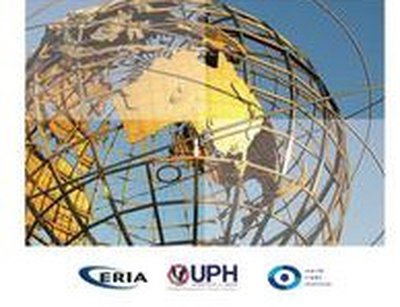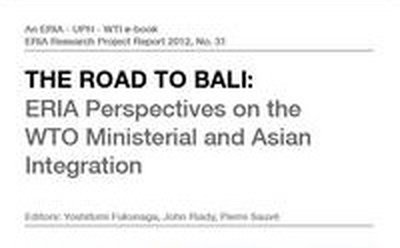7 Nov 2013
E-Book - Asian views of the upcoming WTO Ministerial Conference
The Road to Bali: ERIA Perspectives on the WTO Ministerial and Asian Integration
An ERIA – UPH – WTI e-Book edited by Yoshifumi Fukunaga, John Riady and Pierre Sauvé
As the World Trade Organization (WTO) prepares for its Ninth Ministerial Conference in Bali, Indonesia, in December, a new e-book sheds light on Asian perspectives on the meeting that comes at a critical juncture for the multilateral trade body.
The result of close to one year of collaboration between the World Trade Institute (WTI), the Universitas Pelita Harapan (UPH), Indonesia, and ERIA, the Jakarta-based Economic Research Institute for ASEAN and East Asia, the e-book was produced with the support of the Swiss State Secretariat for Economic Affairs (SECO) in the context of an academic cooperation project implemented by the World Trade Institute (WTI).
ERIA uploaded the e-book to its website on 8 November.
The book will be formally launched at a seminar held on the margins of the Ministerial Conference on 5 December, at which co-editor and WTI director of external programmes and academic partnerships Pierre Sauvé will speak.
Timely perspectives
“I am very pleased with the outcome of this research endeavour and the timeliness of the perspectives it offers just ahead of the Bali Ministerial. It is also yet another tangible output in the policy bridge building produced under the SECO academic cooperation project, reducing the distance between the academic and policy-making worlds” commented Sauvé.
The Doha Round of trade negotiations has reached an impasse and its future is uncertain. Against that backdrop, the Bali Ministerial affords a unique opportunity to gauge contrasting perceptions across ASEAN and East Asia on the continued relevance of the WTO to trade and economic governance within the region and beyond, according to the book’s editors.
This policy research initiative offers comparative scholarship on some of the key questions from an East Asian perspective. Specifically, it explores what specific outcomes scholars in the region expect the Ministerial to produce and whether it will restore the momentum needed to bring the Doha Round to a successful conclusion. Contributors also investigate how relevant the WTO remains to the multiple processes underway to deepen economic integration in the region.
While expectations of Bali may be modest, contributors concur that imparting forward momentum even on a scaled down agenda would likely carry enormous symbolic value at a time when most forms of multilateral diplomacy, including beyond the trade field, face daunting prospects.
Further info
SECO
Link to e-book on ERIA website
UPH
SECO/WTI Academic Cooperation Project



